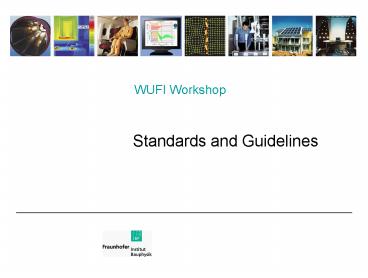WUFISeminar 04 - PowerPoint PPT Presentation
1 / 14
Title:
WUFISeminar 04
Description:
Over the past twenty years WTA has developed into an ... Boundary and initial conditions. Numerical solution (grid size, time steps, accuracy checks) ... – PowerPoint PPT presentation
Number of Views:42
Avg rating:3.0/5.0
Title: WUFISeminar 04
1
Standards and Guidelines
2
Contents
German Standard (Building Code)
WTA-Guidelines
Standards and Guides in Europe and NA
3
DIN-Standard 4108-3
DIN 4108-3 Thermal protection and energy economy
in buildings Protection against moisture
subject to climate conditions from July 2001 is
referred to in the state building codes. It
prescribes the Glaser-method but recommends the
use of hygrothermal simulations for the following
situations ? drying of construction or
precipitation moisture ? green roofs ? unusual
indoor or outdoor climate conditions
EN ISO 13788 Euro-Glaser computing interstitial
condensation on a monthly mean basis has not been
adopted by the DIN committee
4
Contents
German Standard (Building Code)
WTA-Guidelines
Standards and Guides in Europe and NA
5
WTA-Guidelines
International Association for Science and
Technology of Building Maintenance and Monument
Preservation
6
WTA-Guidelines
- Over the past twenty years WTA has developed into
an international platform with members from
different European countries. They have now
organized Regional Branches to help address
complementary tasks, such as - Organization of seminars, conferences and expert
discussions - Cultivating contacts with local research
institutes and regional authorities for the
protection of monuments - Introducing relevant topics into the work of the
WTA divisions - Adapting new insight elaborated by WTA to
regional conditions - Translating WTA-Guidelines into the respective
national language
7
WTA-Guidelines
- WTA-International (located in Munich)
- Regional Groups
- Germany North South
- Netherlands
- Belgium
- Switzerland
- Austria
- Hungary
- Czech Republic
- Slovenia
- Expected new regional Groups
- Poland, Egypt, Malaysia, Singapore, China
8
WTA-Guidelines
- WTA divisions (usually comprising several working
groups) - Wood protection (div. 1)
- Surface technology (div. 2)
- e.g. anti-graffito systems, renovation and salt
extracting rendering systems - Natural stone (div. 3)
- e.g. impregnation, stone substitutes and repair
materials, cleaning methods - Masonry (div. 4)
- e.g. rising damp protection, repointing
- Concrete (div. 5)
- e.g. durability issues, impregnation, ground
water sealing - Physical and chemical fundamentals (div. 6)
- Structural integrity (div. 7)
- Half-timbered constructions (div. 8)
- e.g. building physical loads and limits, retrofit
measures, recommendations for occupants
9
WTA-Guidelines
- WTA-Guideline
- 6-2-01/E Simulation of Heat and Moisture
Transfer - specifies hygrothermal simulations as an
alternative to the Glaser-method - 6-1-01/D Leitfaden für hygrothermische
Simulationsberechnungen (Application guide for
hygrothermal simulations) will also be issued in
English - Motivation of WTA to produce theses guidelines
- Glaser-method proved to be completely
inappropriate for the hygrothermal assessment of
repair measures and rehabilitation design
The European standard draft prEN 15026
Hygrothermal Performance of Building Components
and Building Elements Assessment of Moisture
Transfer by Numerical Simulation is based on
this WTA-Guideline
10
WTA-Guidelines
- Content of WTA-Guideline 6-2-01/E Simulation of
Heat and Moisture Transfer - Potential and limitations of current simulation
methods - Physical fundamentals
- Material properties
- Boundary and initial conditions
- Numerical solution (grid size, time steps,
accuracy checks) - Documentation of results
11
Contents
German Standard (Building Code)
WTA-Guidelines
Standards and Guides in Europe and NA
12
Standards and Guides in Europe and NA
ASTM MNL 40 Moisture Analysis and Condensation
Control in Buildung Envelopes (2001)
Chapter 9 A Hygrothermal Design Tool
for Architects and Engineers (WUFI
ORNL/IBP)
13
Standards and Guides in Europe and NA
ASHRAE Standard 160 Design criteria for
moisture control in buildings (should be
published in 2005) European Standard prEN
15026 Hygrothermal performance of building
components and building elements - Assessment
of moisture transfer by numerical simulation
(August 2004)
14
Standards and Guidelines































